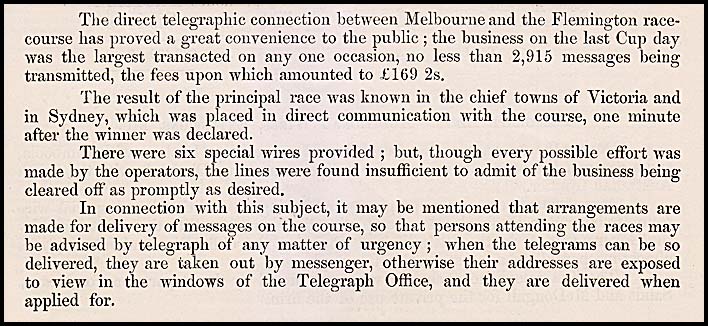Flemington Race Course Telegraph Office.
- Australia 1901-1988
- New South Wales
- Overview of NSW
- Telegraph lines
- Telegraph Offices
- Date stamps
- Forms
- Envelopes
- Instructional annotation
- Collect
- Delayed
- Free
- Immediate Urgent
- Reply paid
- Rates
- Stamps
- 1871 Telegraph stamps
- 1885 proposal
- 1893 proposal
Australia's love of sport - and especially horse racing - led to the establishment of telegraph offices at sporting venues. Initially these were confined to horse race courses.
The first Telegraph Office at a horse track was at Flemington. It opened on
In the 1880 Annual Report, G. D. Landridge, Acting Postmaster-General wrote as follows:

All newspapers naturally carried reports on the running of the 1879 Melbourne Cup. The version in the Bacchus Marsh Express contained the following in the Saturday edition of 8 November:
"The thousands on the course sought to know what number had taken the prize, but the inland towns and capitals of distant colonies had to be told by telegraph what had happened. The numbers had hardly been elevated when the telegraph office was suddenly rushed. The scene as viewed from the inside was a strange one. Six windows were opened, and in an instant.telegrams were thrust in handfuls. Two or three faces wet with perspiration appeared before each aperture, and over the shoulders in front came the arms and hands of the people behind. Some forced in the paper with their fingers, and had the silver coins between their teeth, but were so excited that they did not know what they had done with the money. It was estimated that the Cup messages alone numbered nearly 2,000. By six o'clock, every inland town in possession of a telegraph office and a hotel must have known that Darriwell had won the Cup; by 5 o'clock, the result must have been announced to thousands in Sydney and Adelaide, and perhaps the news had reached the most distant New Zealand towns".
Note Darriwell started at 33/1 and carried 46.27 kg. He beat Sweetmeat and Suwarrow and received prizemoney of £1,945. The French invention of the Totalisator became extremely popular during the 1879 Melbourne Cup as well as off course sweepstakes. The colony soon after declared both types of betting as illegal.
Typical Press telegrams of the type sent from many race courses are:
The Argus of 1 November 1886 commented on
" SMART TELEGRAPHING:
The system of sending results of important races at Flemington and Caulfied to the telegraph offices in the country, from which the information can be disseminated to as many persons as desire it, has been found to work very satisfactorily. By this plan, one message from the course is made to do the service of hundreds which had to be sent in past years.
On Saturday (30 October), applications for the results of the Derby Day races at Flemington were lodged at 200 provincial stations from which over 900 messages were distributed. The result of this arrangement was that the wires were not occupied for any length of time with race messages. By special arrangement with the Eastern Extension Company, the cable to Wellington was kept clear so that, within 20 seconds after Trident had passed the post in the Derby race, the news of his victory was publicly announced in New Zealand. The news was also transmitted instantly to Sydney Adelaide and Brisbane.
The new telegraph office provided by Mr. H. Byron Moore, near the jockey's stand, was of great use in enabling the business to be centralised and dealt with more expeditously than would otherwise have been the case. The department had a staff of thirty-seven officers on the ground under the control of Mr. W. Andrews, Mr. James A. Barray and H. J. Edgar".
The rapid and wide dissemmination of results had benefits as well as drawbacks. One of the problems which arose was the rise in off-course betting.
The Chronicle of 15 August 1903 was one of a number of newspapers to carry the following announcement:
"Mr. M. P. Considine (secretary of the Associated Racing Club) writes to the Melbourne press that it has been decided by the Sandown Park, Aspendale Park, Epsom and Mentone racing clubs to discontinue the ordinary telegraph office, that has been open to the public on their courses, and to have, in its place, a private telegraph office as arranged with the Deputy Postmaster-General. All telegrams sent to the course will be delivered in the usual way to the club's clients. Any person wishing to send telegrams away from the course must send them through the secretary. The reason for this alteration is on account of the numerous 'tote' and betting shops that have sprung up in Melbourne, suburbs, and country towns obtaining, through their agents on the different courses, the starters, jockeys, betting and results of races therefore doing a lot of injury to the race meeting, the owners, horses, &c., that attend the races".